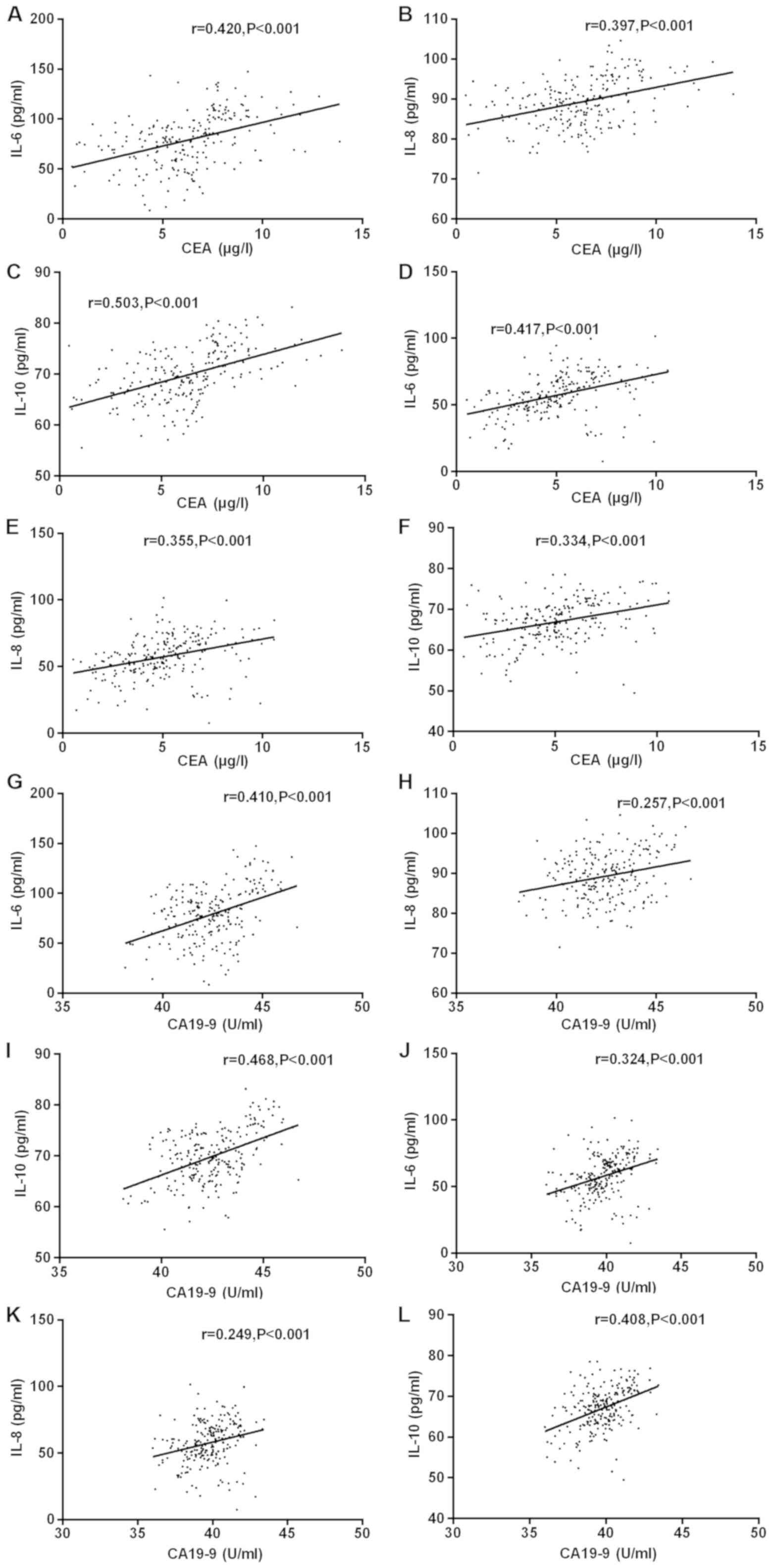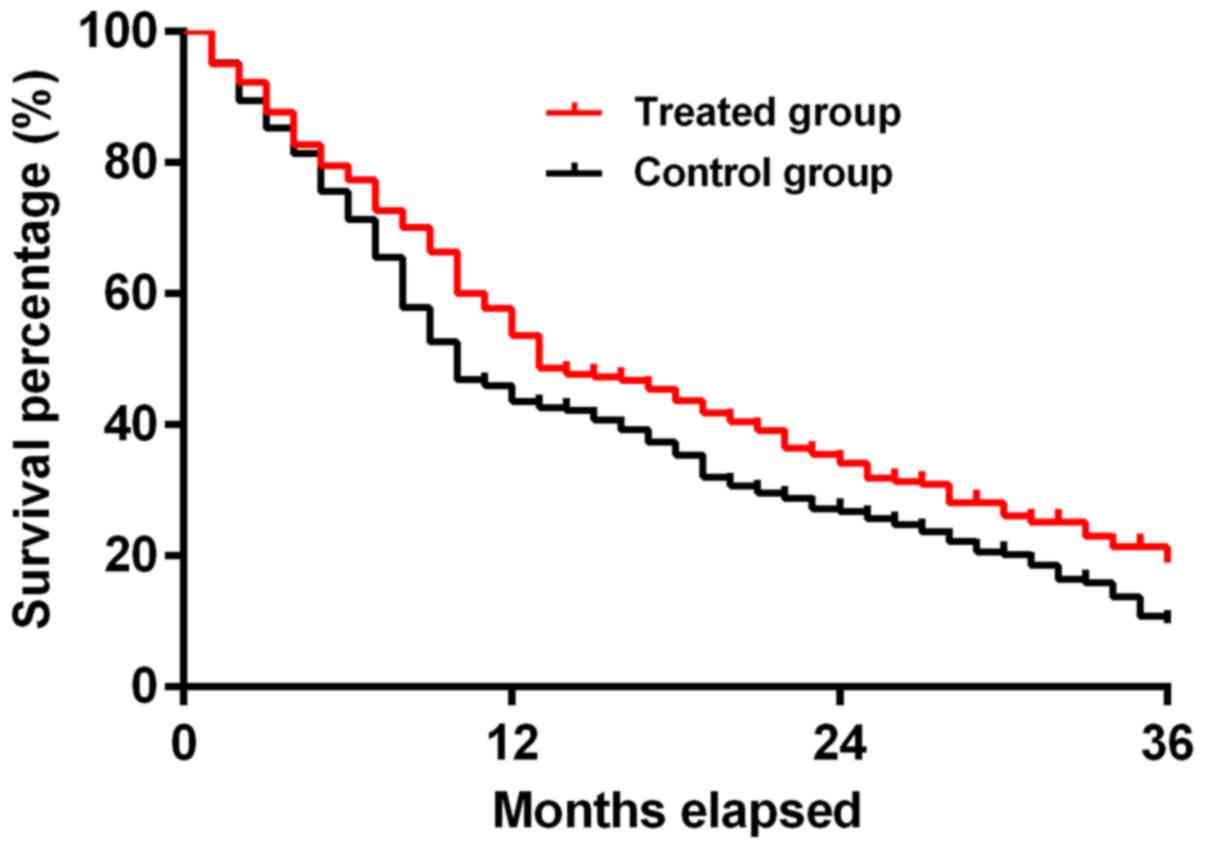|
1
|
Dong X, Wang G, Zhang G, Ni Z, Suo J, Cui
J, Cui A, Yang Q, Xu Y and Li F: The endothelial lipase protein is
promising urinary biomarker for diagnosis of gastric cancer. Diagn
Pathol. 8:452013. View Article : Google Scholar : PubMed/NCBI
|
|
2
|
Torre LA, Bray F, Siegel RL, Ferlay J,
Lortet-Tieulent J and Jemal A: Global cancer statistics, 2012. CA
Cancer J Clin. 65:87–108. 2015. View Article : Google Scholar : PubMed/NCBI
|
|
3
|
Shen L, Li J, Xu J, Pan H, Dai G, Qin S,
Wang L, Wang J, Yang Z, Shu Y, et al: Bevacizumab plus capecitabine
and cisplatin in Chinese patients with inoperable locally advanced
or metastatic gastric or gastroesophageal junction cancer:
Randomized, double-blind, phase III study (AVATAR study). Gastric
Cancer. 18:168–176. 2015. View Article : Google Scholar : PubMed/NCBI
|
|
4
|
Zeng H, Zheng R, Guo Y, Zhang S, Zou X,
Wang N, Zhang L, Tang J, Chen J, Wei K, et al: Cancer survival in
China, 2003–2005: A population-based study. Int J Cancer.
136:1921–1930. 2015. View Article : Google Scholar : PubMed/NCBI
|
|
5
|
Japanese Gastric Cancer Association:
Japanese gastric cancer treatment guidelines 2014 (ver. 4). Gastric
Cancer. 20:1–19. 2017. View Article : Google Scholar
|
|
6
|
Baum RA and Baum S: Interventional
radiology: A half century of innovation. Radiology. 273
(Suppl):S75–S91. 2014. View Article : Google Scholar : PubMed/NCBI
|
|
7
|
Vogl TJ, Gruber-Rouh T, Eichler K,
Nour-Eldin NE, Trojan J, Zangos S and Naguib NN: Repetitive
transarterial chemoembolization (TACE) of liver metastases from
gastric cancer: Local control and survival results. Eur J Radiol.
82:258–263. 2013. View Article : Google Scholar : PubMed/NCBI
|
|
8
|
Chehab MA, Brinjikji W, Copelan A and
Venkatesan AM: Navigational tools for interventional radiology and
interventional oncology applications. Semin Intervent Radiol.
32:416–427. 2015. View Article : Google Scholar : PubMed/NCBI
|
|
9
|
Lu DSK, Raman SS, Limanond P, Aziz D,
Economou J, Busuttil R and Sayre J: Influence of large peritumoral
vessels on outcome of radiofrequency ablation of liver tumors. J
Vasc Interv Radiol. 14:1267–1274. 2003. View Article : Google Scholar : PubMed/NCBI
|
|
10
|
Wang F, Meng W, Wang B and Qiao L:
Helicobacter pylori-induced gastric inflammation and gastric
cancer. Cancer Lett. 345:196–202. 2014. View Article : Google Scholar : PubMed/NCBI
|
|
11
|
Rugge M, Fassan M and Graham DY:
Epidemiology of gastric cancer. Gastric Cancer: Principles and
Practice. Strong VE: 1st. Springer; Cham, Switzerland: pp. 23–34.
2015, View Article : Google Scholar
|
|
12
|
Fu XL, Duan W, Su CY, Mao FY, Lv YP, Teng
YS, Yu PW, Zhuang Y and Zhao YL: Interleukin 6 induces M2
macrophage differentiation by STAT3 activation that correlates with
gastric cancer progression. Cancer Immunol Immunother.
66:1597–1608. 2017. View Article : Google Scholar : PubMed/NCBI
|
|
13
|
Li W, Zhou Y, Yang J, Zhang X, Zhang H,
Zhang T, Zhao S, Zheng P, Huo J and Wu H: Gastric cancer-derived
mesenchymal stem cells prompt gastric cancer progression through
secretion of interleukin-8. J Exp Clin Cancer Res. 34:52. 2015.
View Article : Google Scholar : PubMed/NCBI
|
|
14
|
Pachnia D, Drop B, Dworzańska A,
Kliszczewska E and Polz-Dacewicz M: Transforming growth factor-β,
interleukin-10, and serological markers in EBV-associated gastric
carcinoma. Anticancer Res. 37:4853–4858. 2017.PubMed/NCBI
|
|
15
|
Kang JM, Kim N, Lee DH, Park JH, Lee MK,
Kim JS, Jung HC and Song IS: The effects of genetic polymorphisms
of IL-6, IL-8, and IL-10 on Helicobacter pylori-induced
gastroduodenal diseases in Korea. J Clin Gastroenterol. 43:420–428.
2009. View Article : Google Scholar : PubMed/NCBI
|
|
16
|
Taniguchi K and Karin M: IL-6 and related
cytokines as the critical lynchpins between inflammation and
cancer. Semin Immunol. 26:54–74. 2014. View Article : Google Scholar : PubMed/NCBI
|
|
17
|
Huang SP, Wu MS, Shun CT, Wang HP, Lin MT,
Kuo ML and Lin JT: Interleukin-6 increases vascular endothelial
growth factor and angiogenesis in gastric carcinoma. J Biomed Sci.
11:517–527. 2004. View Article : Google Scholar : PubMed/NCBI
|
|
18
|
Zhang XY, Chan WY, Whitney BM, Fan DM,
Chow JH, Liu Y, Ng EK and Chung SC: Changes of interleukin
expression correlate with Helicobacter pylori infection and
lymph node metastases in gastric carcinoma. Diagn Mol Pathol.
11:135–139. 2002. View Article : Google Scholar : PubMed/NCBI
|
|
19
|
Malalasekera A, Tan CSY, Phan V, Yip PY,
Vardy J, Clarke S and Kao S: Eastern Cooperative Oncology Group
score: Agreement between non-small-cell lung cancer patients and
their oncologists and clinical implications. Cancer Treat Commun.
5:17–21. 2016. View Article : Google Scholar
|
|
20
|
Vincent MD, Breadner D, Cripps MC, Jonker
DJ, Klimo P, Biagi JJ, Lam W, O'Connell A, Whiston F, Stitt L, et
al: Phase I/II trial of dose-reduced capecitabine in elderly
patients with advanced colorectal cancer. Curr Oncol. 24:e261–e268.
2017. View Article : Google Scholar : PubMed/NCBI
|
|
21
|
Wang J, Shi H, Yang G, Han G, Zhao M, Duan
X, Mi L, Han X, Li N, Shi J, et al: Combined intra-arterial and
intravenous chemotherapy for unresectable, advanced gastric cancer
has an improved curative effect compared with intravenous
chemotherapy only. Oncol Lett. 15:5662–5670. 2018.PubMed/NCBI
|
|
22
|
Kim HS, Kim JW, Kim JH, Choi DR, Han AR,
Kim MJ, Kim BC and Zang DY: Single-lesion measurement per organ for
assessing tumor response in advanced gastric cancer. Oncology.
88:69–75. 2015. View Article : Google Scholar : PubMed/NCBI
|
|
23
|
Trotti A, Byhardt R, Stetz J, Gwede C,
Corn B, Fu K, Gunderson L, McCormick B, Morrisintegral M, Rich T,
et al: Common toxicity criteria: version 2.0. An improved reference
for grading the acute effects of cancer treatment: Impact on
radiotherapy. Int J Radiat Oncol Biol Phys. 47:13–47. 2000.
View Article : Google Scholar : PubMed/NCBI
|
|
24
|
Amin MB, Greene FL, Edge SB, Compton CC,
Gershenwald JE, Brookland RK, Meyer L, Gress DM, Byrd DR and
Winchester DP: The Eighth Edition AJCC Cancer Staging Manual:
Continuing to build a bridge from a population-based to a more
‘personalized’ approach to cancer staging. CA Cancer J Clin.
67:93–99. 2017. View Article : Google Scholar : PubMed/NCBI
|
|
25
|
Wang L, Wang X, Kou H, He H, Lu M, Zhou L
and Yang Y: Comparing single oral contrast-enhanced ultrasonography
and double contrast-enhanced ultrasonography in the preoperative
Borrmann classification of advanced gastric cancer. Oncotarget.
9:8716–8724. 2017.PubMed/NCBI
|
|
26
|
Liu G, Jian F, Wang X and Chen L:
Fast-track surgery protocol in elderly patients undergoing
laparoscopic radical gastrectomy for gastric cancer: A randomized
controlled trial. Onco Targets Ther. 9:3345–3351. 2016.PubMed/NCBI
|
|
27
|
Shi J, Gao P, Song Y, Chen X, Li Y, Zhang
C, Wang H and Wang Z: Efficacy and safety of taxane-based systemic
chemotherapy of advanced gastric cancer: A systematic review and
meta-analysis. Sci Rep. 7:53192017. View Article : Google Scholar : PubMed/NCBI
|
|
28
|
de Baere T, Arai Y, Lencioni R, Geschwind
JF, Rilling W, Salem R, Matsui O and Soulen MC: Treatment of liver
tumors with lipiodol TACE: Technical recommendations from experts
opinion. Cardiovasc Intervent Radiol. 39:334–343. 2016. View Article : Google Scholar : PubMed/NCBI
|
|
29
|
Acharya A, Markar SR, Matar M, Ni M and
Hanna GB: Use of tumor markers in gastrointestinal cancers: Surgeon
perceptions and cost-benefit trade-off analysis. Ann Surg Oncol.
24:1165–1173. 2017. View Article : Google Scholar : PubMed/NCBI
|
|
30
|
Lee EC, Yang JY, Lee KG, Oh SY, Suh YS,
Kong SH, Yang HK and Lee HJ: The value of postoperative serum
carcinoembryonic antigen and carbohydrate antigen 19-9 levels for
the early detection of gastric cancer recurrence after curative
resection. J Gastric Cancer. 14:221–228. 2014. View Article : Google Scholar : PubMed/NCBI
|
|
31
|
Lee DW, Im SA, Kim YJ, Yang Y, Rhee J, Na
II, Lee KH, Kim TY, Han SW, Choi IS, et al: CA19-9 or CEA decline
after the first cycle of treatment predicts survival in advanced
biliary tract cancer patients treated with S-1 and cisplatin
chemotherapy. Cancer Res Treat. 49:807–815. 2017. View Article : Google Scholar : PubMed/NCBI
|
|
32
|
Kanehira Y, Togami K, Tada H and Chono S:
Tumor distribution and anti-tumor effect of doxorubicin following
intrapulmonary administration to mice with metastatic lung tumor. J
Drug Deliv Sci Technol. 33:143–148. 2016. View Article : Google Scholar
|
|
33
|
Pucheanu X and Beuran M: Bleeding gastric
cancer in young and elderly patients. J Med Life. 8:356–360.
2015.PubMed/NCBI
|
|
34
|
Niekamp A, Sheth RA, Kuban J, Avritscher R
and Ganguli S: Palliative embolization for refractory bleeding.
Semin Intervent Radiol. 34:387–397. 2017. View Article : Google Scholar : PubMed/NCBI
|
|
35
|
Kim YI and Choi IJ: Endoscopic management
of tumor bleeding from inoperable gastric cancer. Clin Endosc.
48:121–127. 2015. View Article : Google Scholar : PubMed/NCBI
|
|
36
|
Jung DH, Lee YC, Kim JH, Chung H, Park JC,
Shin SK, Lee SK, Kim HI, Hyung WJ and Noh SH: Postoperative
Helicobacter pylori infection as a prognostic factor for
gastric cancer patients after curative resection. Gut Liver.
11:635–641. 2017. View
Article : Google Scholar : PubMed/NCBI
|
|
37
|
Postlewait LM, Squires MH III, Kooby DA,
Poultsides GA, Weber SM, Bloomston M, Fields RC, Pawlik TM,
Votanopoulos KI, Schmidt CR, et al: Preoperative Helicobacter
pylori infection is associated with increased survival after
resection of gastric adenocarcinoma. Ann Surg Oncol. 23:1225–1233.
2016. View Article : Google Scholar : PubMed/NCBI
|
|
38
|
Chang WJ, Du Y, Zhao X, Ma LY and Cao GW:
Inflammation- related factors predicting prognosis of gastric
cancer. World J Gastroenterol. 20:4586–4596. 2014. View Article : Google Scholar : PubMed/NCBI
|
|
39
|
Li C, Oh SJ, Kim S, Hyung WJ, Yan M, Zhu
ZG and Noh SH: Macroscopic Borrmann type as a simple prognostic
indicator in patients with advanced gastric cancer. Oncology.
77:197–204. 2009. View Article : Google Scholar : PubMed/NCBI
|
|
40
|
Zu H, Wang H, Li C and Xue Y:
Clinicopathologic characteristics and prognostic value of various
histological types in advanced gastric cancer. Int J Clin Exp
Pathol. 7:5692–5700. 2014.PubMed/NCBI
|
|
41
|
Gopinathan G, Milagre C, Pearce OM,
Reynolds LE, Hodivala-Dilke K, Leinster DA, Zhong H, Hollingsworth
RE, Thompson R, Whiteford JR, et al: Interleukin-6 stimulates
defective angiogenesis. Cancer Res. 75:3098–3107. 2015. View Article : Google Scholar : PubMed/NCBI
|
|
42
|
Sanmamed MF, Carranza-Rua O, Alfaro C,
Oñate C, Martín-Algarra S, Perez G, Landazuri SF, Gonzalez A, Gross
S, Rodriguez I, et al: Serum interleukin-8 reflects tumor burden
and treatment response across malignancies of multiple tissue
origins. Clin Cancer Res. 20:5697–5707. 2014. View Article : Google Scholar : PubMed/NCBI
|
|
43
|
Geginat J, Larghi P, Paroni M, Nizzoli G,
Penatti A, Pagani M, Gagliani N, Meroni P, Abrignani S and Flavell
RA: The light and the dark sides of Interleukin-10 in
immune-mediated diseases and cancer. Cytokine Growth Factor Rev.
30:87–93. 2016. View Article : Google Scholar : PubMed/NCBI
|
















